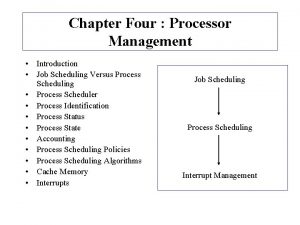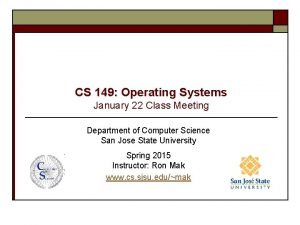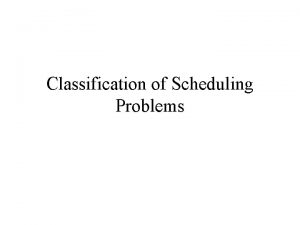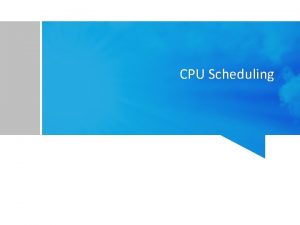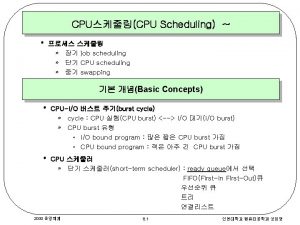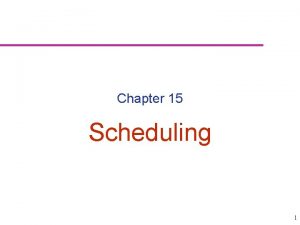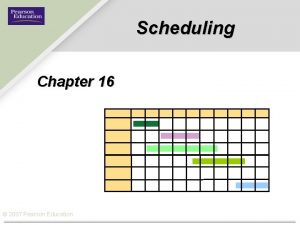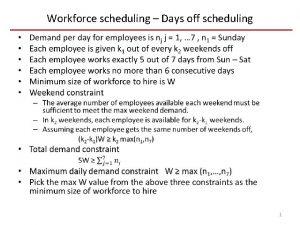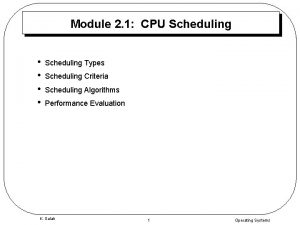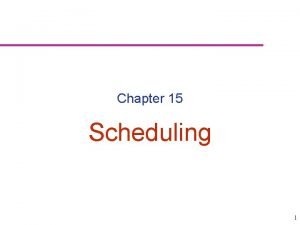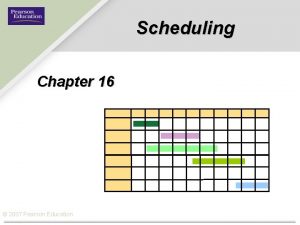Scheduling Ron Lovshmnn www Cipart Oi com 1047689


















- Slides: 18

Scheduling ©Ron Lovshmnn * www Cipart. Oi. com. ' 1047689

Right People, Right Skills, Right Place, Right Time

Introduction �Scheduling personnel is a complex, time –consuming, and frequently perplexing task. However it must be done. Appropriate work scheduling is a prerequisite for successful nursing operations, because pattering of working/ non-working hours directly affects employee productivity, work satisfaction, and job tenure

Definition �Planning pattern of on-off duty hours for employee in a particular unit for a given period of times �OR �Distribution of hours to be worked by each person during each 24 hours, 7 days a week, per a month

Objective of time planning: � To provide adequate staffing to meet patient care needs according to the philosophy and policy of the organization during a 24 hrs period. � To utilize experience and skills to the best advantage. � To organize work in the unit. � Prevent confusion by avoiding periods of understaffing and overstaffing. � To maintain staff morale (Equity of treatment to all employees). � To match accurately units needs with staff abilities and number. � To define responsibilities of personnel.

Principles of time planning: 1) It should be planned to meet needs of each time period and balance the needs of patients and personnel. 2) There must be an equitable distribution of the desirable as well as undesirable hours of duty. 3) Scheduling policies must be identified at the time of employment 4) An employee must be assured that his assigned time on duty will not change unless an extreme emergency arises and only with his permission. 5) All staff members should be assigned similar duty hours as much as possible, and days off should be equitable for all personnel.

1) There should no accumulation of days off. 2) There should be a professional nurse on duty at all times during the 24 -hour period. 3) Draw up a long-term plan to maintain morale (e. g. made out for a monthly period). 4) Special requests should be granted if reasonable 5) Changes in the time schedule should be kept to a minimum. 6) There should be an overlapping of each shift to provide time for shift reports. 7) There should be a day apart between head nurse and assistant head nurse days off.

1) The head nurse is rarely off duty on Saturday, which is the beginning of the week. 2) A day off is given before and after a night shift. 3) The head nurse has to be sure that the unit is adequately staffed when inexperienced staff is working 4) If time for students is planning by the head nurse, certain points should be considered: � A-It should be planned cooperatively with instructor. � B-Remember time off is given when there are no classes. � C- Keep students well supported by graduate staff. � D- Allow for slight over-lapping of each shift.

Scheduling Policies: 1) The person, by title, who is responsible for preparing employees' time schedules. 2) The total on-duty hours required for each employee per day, week, or month. ) 3) The day that starts the work week (Saturday? Monday? ) 4) The beginning and ending hour for each work shift. 5) The amount of time allowed for work and meal breaks. 6) The number of shifts to which each employee must rotate.

1) The number of weekends per month that an employee must work 2) The conditions under which an employee may be "floated" to another unit. 3) The minimum time interval between work shift (8, 12 hours). 4) The procedure to be used by employees in requesting OFF duty time for specific holidays as : ( Vocation time, Emergency time, Sick days). 5) The restriction on vacation scheduling during feast.

Systems of time planning: Centralized scheduling: • The schedule done by the upper manager for all nurses in computer. all departments The advantages: - Fairness to employees manually or by through consistent, objective, and impartial application of policies and opportunities for cost containment through better use of resources. - Relieves nurse managers from time-consuming duties, freeing them for other activities.

�Computer can be used for centralized scheduling. The advantage of this include cost-effectiveness through the reduction of clerical staff and better use of professional nurses by decreasing the time spent in non-patient care activities; unbiased, consistent scheduling; equitable application of agency policy; developed in advance so employees know what their schedule are and can plan their personal live accordingly. �Disadvantages: �Lack of individualized treatment of employees is a chief complaint.

Decentralized scheduling �When managers are given authority and assume responsibility, they can staff their own units through decentralized scheduling. � Advantages: �Personnel feel that they get more personalized attention with decentralized scheduling. �Staffing is easier and less complicated when done for a small area instead of for the whole agency. �Managers can work together to solve chronic staffing problems.

Disadvantages: �Some staff members may receive individualized treatment at the expense of others. �Work schedules can be used as a punish- reward system. �Because it is consuming time, takes managers away from other duties or forces them to do the scheduling while off duty. �it may use resources less efficiently and consequently make cost containment more difficult

Self scheduling �Self scheduling is a system that is coordinated by staff nurses. Staff may negotiate before and after work and during break and lunchtime. They may also write notes to each other and Waite for responses

• Advantages: 1. Help create a climate where professional nursing can be practiced. 2. Saves the manager considerable scheduling time and changes the role of the manager from supervisor to coach.

• Increases staff members negotiate with each others. ability to • Increased perception of autonomy, increased job satisfaction, increased cooperative atmosphere, improved team spirit, improved morale, decreased absenteeism, reduced turnove r.

• Block, cyclical scheduling �Block, or cyclical, scheduling uses the same schedule repeatedly. The schedule repeat itself every 6 weeks. �Advantages: �personnel know their schedules in advance and consequently can plan their social live. �Absenteeism will be less. �establish stable work groups and decrease floating, thus promoting team spirit and continuity of care.
 Bài thơ mẹ đi làm từ sáng sớm
Bài thơ mẹ đi làm từ sáng sớm Cơm
Cơm Sjn scheduling
Sjn scheduling Ron mc slide
Ron mc slide Ron lembke
Ron lembke Beaco2n
Beaco2n Alicia kurtz
Alicia kurtz Ron hays ucla
Ron hays ucla Yo tengo un piojo hueso cancion infantil
Yo tengo un piojo hueso cancion infantil Ron harbour
Ron harbour Summary changer
Summary changer Ron weiss mit
Ron weiss mit How were conglomerates and franchises alike and different
How were conglomerates and franchises alike and different Hattie berger
Hattie berger Ron clarke 1992
Ron clarke 1992 Ron mak sjsu
Ron mak sjsu Ron jones pastor
Ron jones pastor Sjsu cs 149
Sjsu cs 149 Ron korkut
Ron korkut


